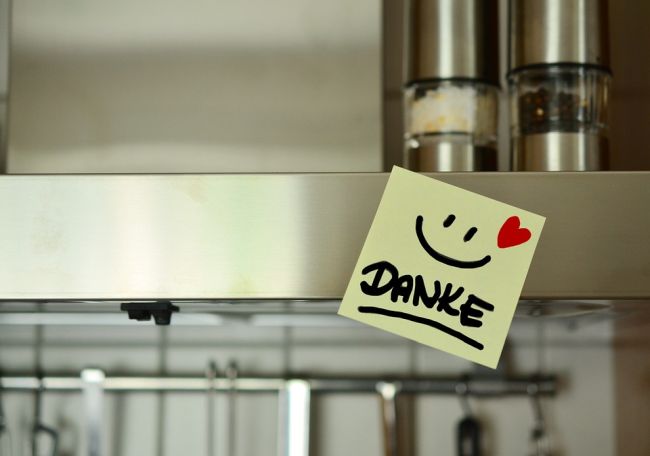
These divrei Torah were adapted from the hashkafa portion of Rabbi Yissochar Frand’s Commuter Chavrusah Torah Tapes on the weekly Torah portion: Tape #92, Selling Non-Kosher Foods. Good Shabbos!
Double Entendre in the Word “Hoda’ah”
Among the sacrifices mentioned in this week’s parsha is the Thanksgiving Offering. The Medrash says that in the future all the sacrifices will be nullified except the Thanksgiving Offering — because there is always need to give thanks.
Rav Hutner z”tl, makes a very interesting point. “Todah” [thanks] comes from the word “Hoda’ah,” meaning giving thanks. However, the word “Hoda’ah” also means to admit (as in the expression Hoda’as ba’al din k’meah edim dami – an admission of a litigant is like one hundred witnesses).
Rav Hutner says that it is no coincidence that the word for thanking and the word for admitting are one and the same. In order for a person to give thanks, he must be able to admit that he needed help. The first step in being grateful to someone for doing something for you is the admission that you needed help and that you are not all powerful. Therefore, the Hebrew word for thanks and for admission are the same.
How do we know whether an occurrence of the word “Hoda’ah” means admission or thanks? Rav Hutner says that we need to look at the preposition that comes after the word. The word “Hoda’ah” — meaning admission — is always followed by the Hebrew preposition ‘”sheh…” [that]. The word “Hoda’ah” — meaning thanks — is always followed by the Hebrew word “al …” [for].
In davening [prayers], there is a Blessing of Modim, called the Blessing of “Hoda’ah”. How does it read? “Modim anachnu lach sheh…” This indicates that the first thing we must do is not thank G-d, but admit to G-d that we are dependent on Him. Once we come to that understanding, then we are ready for the end of the blessing where we say “Nodeh lecha… …al…” — We thank You for… Birkas HaHoda’ah is thus a two-stage blessing. It begins with a Hoda’ah of admission and then climaxes with a Hoda’ah of thanking at the end.
We Can’t Appoint an Agent to Say ‘Thank-You’
I recently saw a beautiful insight in the Avudraham. When the Chazan says Modim, the congregation recites a prayer known as “The Rabbis’ Modim”. Why is that? We listen silently during most of the repetition of Shmoneh Esrei. Why is Modim different? The Avudraham says that for all blessings in the Shmoneh Esrei we can use the services of an agent. ‘Heal Us’ and ‘Bless Us with a Good Year’, and so forth have messengers — the Shliach Tzibbur can say the blessing for us. However, there is one thing that nobody else can say for us. We must say it for ourselves. That one thing is “Thank You”. Hoda’ah needs to come from ourselves. No one can be our agent to say ‘Thank You’.
Transcribed by David Twersky; Seattle, Washington.
Technical Assistance by Dovid Hoffman; Baltimore, Maryland.
This write-up is adapted from the hashkafa portion of Rabbi Yissocher Frand’s Commuter Chavrusah Torah Tapes on the weekly Torah Portion. The halachic topics covered for the current week’s portion in this series are:
- Tape # 004 – When to Make the Bracha of HaGomel
- Tape # 049 – Purim: Shalach Manos
- Tape # 092 – Non-Kosher Products: The Dilemma of the Jewish Merchant
- Tape # 140 – Pesach: The Mitzvah of Daled Kosos
- Tape # 187 – Pesach: Does Maror Require a K’zayis?
- Tape # 233 – Pesach: Women and Daled Kosos
- Tape # 277 – Pesach: The Mitzvah of Heseiba
- Tape # 323 – Pesach: Eating Matzo: How Fast?
- Tape # 367 – Pesach: Afikomen After Chatzos
- Tape # 411 – Pesach: Netilas Yodayim for Karpas & Wet Fruit
- Tape # 455 – Pesach: Daled Kosos: Another Look
- Tape # 499 – Davening Quietly
- Tape # 543 – Birchas Hagomel, Airplane Travel & Other Issues
- Tape # 587 – Afikomen Revisited
- Tape # 631 – Bleeding Gums- More Than a Periodontal Problem
- Tape # 675 – Going Away for Pesach and Bedikas Chometz
- Tape # 719 – The Importance of Shabbos Clothes
- Tape # 763 – Eating Matzo When Ill
- Tape # 807 – Who Says Haggadah in Your House? Hallel in Shul? Etc.
- Tape # 851 – Proper Attire for Davening
- Tape # 895 – Birchas HaGomel – More Insights
- Tape # 939 – Pesach: Gefilte Fish, Ch’rain and Charoses?
Tapes or a complete catalogue can be ordered from the Yad Yechiel Institute, PO Box 511, Owings Mills MD 21117-0511. Call (410) 358-0416 or e-mail [email protected] or visit http://www.yadyechiel.org/ for further information.


